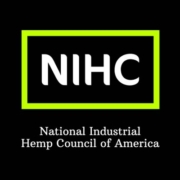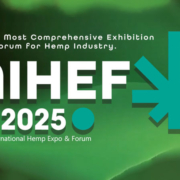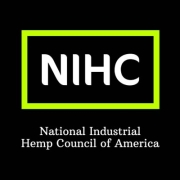Dear Chairwoman Stabenow and Ranking Member Boozman:
On behalf of our members nationwide, the National Industrial Hemp Council of America (NIHC) offers its recommendations, enclosed with this letter, for incorporation in the 2023 Farm Bill toward ensuring the viability and global competitiveness of U.S. domestic hemp production. The 2018 Farm Bill re-legalized the production of hemp, and before that, the 2014 Farm Bill authorized its research, but these new authorities have fallen short in enabling hemp to develop as a commodity at a significant scale. As Congress takes up our nation’s next Farm Bill, the time has come to apply the many lessons learned over the past decade and resolve these shortcomings.
Few if any crops have ever presented such a wide range of uses as hemp. Integral to human civilizations for millennia, and with countless innovative applications emerging at a dizzying pace, hemp produces high-protein foods and feeds from its seeds; wide-ranging industrial applications from its stalks, including textiles, paper, bioplastics, building materials, renewable energy, and advanced composites; and wellness products in high demand by consumers worldwide. Grown at scale, hemp offers an unparalleled opportunity for climate-smart agriculture, resilient rural economies, and increased domestic self-reliance in food security and manufacturing. But despite the best efforts by regulators and industry stakeholders, shortcomings in Federal law continue to squander these opportunities and portend hemp’s demise as a U.S. commodity if not resolved in the next Farm Bill. NIHC’s recommendations are aimed at avoiding such an outcome.
NIHC is the hemp industry’s DC-based trade association. We serve our members and the industry at large by integrating our industry’s expanding expertise with senior-level agricultural policy practice to deliver credible analysis and coordination on the full range of legislative, budgetary and regulatory matters impacting the hemp value chain. Headed by former USDA executives, senior Hill staffers and agricultural trade association leaders, we focus on building capacity for farmers, businesses, regulators and consumers across all segments of the hemp industry, to fulfill hemp’s promise as a keystone of American agriculture and as a driver of opportunity for all.
The 2018 Farm Bill re-legalized the production of hemp, and before that the 2014 Farm Bill authorized its research, but these new authorities have fallen short in enabling hemp to develop as a commodity at significant scale. As Congress takes up our nation’s next Farm Bill, the time has come to apply the many lessons learned over the past decade and resolve these shortcomings. Few if any crops have ever presented such a wide range of uses as hemp. Integral to human civilizations for millennia, and with countless innovative applications emerging at a dizzying pace, hemp produces high protein foods and feeds from its seeds; wide-ranging industrial applications from its stalks, including textiles, paper, bioplastics, building materials, renewable energy, and advanced composites; and wellness products in high demand by consumers worldwide. Grown at scale, hemp offers unparalleled opportunity for climate-smart agriculture, resilient rural economies, and increased domestic self-reliance in food security and manufacturing.
But despite the best efforts by regulators and industry stakeholders, shortcomings in Federal law continue to squander these opportunities and portend hemp’s demise as a U.S. commodity if not resolved in the next Farm Bill. With that decade of lessons in mind, and with the goal of unfettering this new yet ancient crop to fulfill its promise for American agriculture, the National Industrial Hemp Council offers the following recommendations for inclusion in the next Farm Bill:
1. FIT-FOR-PURPOSE COMPLIANCE TESTING.
- Dual hemp licensing: Differentiate “Industrial” (fiber and grain) from “Horticultural” (flower).
- Test products at point of transfer/sale: Consistent USDA controls on lawful transfer of hemp.
- Performance-based sampling for “Industrial,” pre-harvest testing for “Horticultural:”. Visual inspection of “Industrial” and statistically valid pre-harvest testing of “Horticultural.”
- Adopt the NASDA-recommended threshold of 1% total concentration of all tetrahydrocannabinols, to relieve farmers of undue risk and avoid false findings of non-compliance.
- Permanently remove requirements for DEA certification of hemp testing labs.
2. EQUITY AND OPPORTUNITY FOR ALL IN DOMESTIC HEMP PRODUCTION.
- Eliminate background checks and remove felon ban for hemp farming.
- Prohibit the re-criminalization of hemp.
- Designate hemp seed and hempseed by-products as feed for non-consumption animals.
- Enact “Safe Banking” for hemp.
3. NORMALIZE HEMP IN USDA RESEARCH AND SUPPORT PROGRAMS.
- Permanently dual-designate hemp as both specialty and commodity crop depending on the purpose for which it is grown.
- Direct USDA to include hemp in all subsidy and grant opportunities for which other commodity and specialty crops qualify, including research programs.
- Permanently authorize hemp as eligible feedstock for renewable energy research and support.
- Ensure USDA has access to adequate funding to administer hemp production in all 50 states;
- Increase USDA FAS MAP and FMD funding to increase promotion of US hemp exports.
- Establish and fund US Hemp Fiber Standards and Quality Act to create an ARS hemp structure and research center similar to the Cotton Structure and Quality Research Unit in New Orleans.
- Authorize and fund a properly staffed, USDA-led inter-departmental hemp working group and FACA committee that includes multiple agencies and a cross-section of hemp industry stakeholders.
1. FIT-FOR-PURPOSE COMPLIANCE TESTING.
One of the greatest hindrances to hemp production in the United States is the protocol for THC compliance testing. Though hemp has been produced overwhelmingly throughout its multi-millennial history for products of its seeds (grain) and stalks (fiber), which are biologically incapable of producing THC or any other cannabinoid, U.S. law currently requires THC testing of all hemp crops, including those grown for fiber and grain, but does not require testing of hemp products. This is the case even though THC levels can fluctuate slightly in all hemp crops due to conditions beyond farmers’ control, whereas finished products can be specially formulated in a controlled setting to contain specified amounts of THC and synthetic analogs. Thus, the current approach to hemp compliance testing carries undue risk to farmers, which has a chilling effect on farmer adoption and investment (particularly in fiber and grain), while having little bearing on the amount of THC in products entering the hemp market. Ideally, hemp should be treated like any other agricultural commodity and not subjected to compliance testing of crops in the field, but rather tested and certified as needed when the resulting products enter commerce, just like dairy, meat and cotton.
Nevertheless, NIHC recognizes that hemp, as a type of cannabis, elicits a range of stakeholder concerns that are heightened by its cultivation–especially horticultural cultivation of hemp for CBD production, which is difficult to distinguish from cultivation of marijuana. For this reason we propose to differentiate testing of crops grown for fiber and grain (“Industrial Hemp”) from testing of crops grown for flower and their cannabinoids (“Horticultural Hemp”), while establishing meaningful protocols for testing of hemp products upon entering commerce:
A. Fit-for-purpose hemp licensing – Differentiate “Industrial Hemp” (fiber and grain production) and “Horticultural Hemp” (flower/cannabinoid-only production):
Direct USDA to develop regulations for issuing two license types nationwide; states can opt out of dual licensing and authorize only one or the other. Industrial Hemp: fiber and grain crops and products thereof, grown only outdoors (broadacre); USDA to define quantitative criteria, such as plant density, in rulemaking. Horticultural Hemp: flower crops, nursery stock and products thereof. Any hemp crop not meeting Industrial Hemp criteria is Horticultural Hemp. Include a research sub-license type for companies that are developing and producing seeds for replanting purposes.
B. Fit-for-purpose testing of hemp products at point of transfer/sale:
Direct USDA to develop regulations for consistent nationwide controls on lawful transfer of hemp products: ‘Industrial Hemp License:’ (verifying that crop is from licensed producer) must accompany all transfers regardless of type—industrial or horticultural. ‘USDA-Compliant Hemp Certificate:’ (establishing THC compliance, similar to how USDA certifies dairy, meat, etc.) must accompany all transfers containing flower or flower derivatives, regardless of license type—industrial or horticultural. ‘USDA Hemp Processor License:’ must accompany in-process flower derivatives (concentrates) that exceed the Federal threshold for THC in hemp; not for retail sale, and lawful for possession and transfer only by holders of the USDA Hemp Processor License.
C. Fit-for-purpose performance-based sampling and testing of hemp crops.
Direct USDA to apply statistically valid testing of horticultural hemp crops to ensure against illicit marijuana production, and to apply its existing performance-based sampling authority nationally for industrial hemp crops: Performance-Based Sampling for Industrial Hemp crops: Direct USDA to apply its existing authority for performance-based sampling nationwide, with visual inspection criteria for Industrial Hemp Pre-Harvest Sampling and Testing for Horticultural Hemp crops: Direct USDA to update its existing pre-harvest sampling and testing regulations to ensure that compliance determinations are made based on statistically valid confidence intervals (margins of error) for estimated THC levels, accounting for in-field sampling variance as well as laboratory measurement uncertainty. Performance-Based Sampling Option for Horticultural Hemp crops: Direct USDA to standardize it existing authority for performance-based sampling as an available alternative to pre-harvest sampling and testing for horticultural licensees based on 3 prior years of compliant tests, and for immature nursery stock. Fund research to determine potential applicability of variety/seed certifications for use in performance-based sampling.
D. Adopt the NASDA-recommended threshold of 1% total concentration of all tetrahydrocannabinols.
To relieve farmers of undue risk and avoid false findings of non-compliance. Another major factor causing compliance testing to be a hindrance is the definition of hemp as provided in the 2018 Farm Bill, which is based on a 0.3% delta-9 THC threshold for compliance. The originators of this 0.3% figure explicitly acknowledged it as arbitrary in the peer-reviewed scientific literature where it first appeared (Small and Cronquist, 1976), and reiterated this acknowledgment in public statements in 2021 while further recommending 1% as a more appropriate threshold. The current definition also does nothing to limit the entry into the hemp market of products containing other intoxicating tetrahydrocannabinols besides delta-9. Finally, the natural range of variation of hemp plants in the field makes it problematic at best to determine non-compliance with statistical validity at such a minuscule quantity. If challenged in court, the overwhelming majority of non-compliance determinations made under the existing definition would likely not meet the minimal burden of proof for sanctioning private property as required by the Administrative Procedures Act. To rectify these problems, NIHC supports the resolution adopted by the National Association of State Departments of Agriculture, by a 45-3 vote, to revise the definition as follows: The term “hemp” means the plant Cannabis sativa L. and any part of that plant, including the seeds thereof and all derivatives, extracts, cannabinoids, isomers, acids, salts, and salts of isomers, whether growing or not, with a total tetrahydrocannabinol concentration of not more than one (1) percent on a dry weight basis.
E. Permanently remove requirements for DEA certification of hemp testing labs.
Since promulgating its regulations implementing 2018 Farm Bill direction for domestic hemp production, which includes this provision, USDA has wisely exercised its administrative discretion to suspend this requirement every year, lest it hobble the industry for lack of sufficient DEA-certified laboratory capacity around the country. Labs with USDA-approved accreditations, which can be found in greater abundance around the country and also newly established at lower cost, can be relied upon to provide adequate verification of THC levels for determining compliance. Congress should thus eliminate the DEA certification requirement in favor of this approach.
2. EQUITY AND OPPORTUNITY FOR ALL IN DOMESTIC HEMP PRODUCTION.
A. Eliminate background checks and remove felon ban for hemp farming. No other agricultural commodity requires such a policy, which most impacts rural and underserved communities, reinstitutionalizes the racial injustices of the War on Drugs, and harkens to the long history of racial discrimination in American agriculture that USDA and the nation at large still struggles to overcome. Such restrictions should not be permitted in Federal or State law. Furthermore, farming is a productive pathway for people convicted of felonies to re-engage in their communities. No correlation has been shown to indicate that former felons are any likelier to commit crimes in connection with hemp farming than in connection with farming of any other crop.
B. Prohibit the re-criminalization of hemp. As with the discriminatory undertones of banning felons and requiring background checks for hemp licensing, numerous efforts are underway at the state level that portend to restrict interstate commerce in Federally lawful hemp and hemp products, and in some cases even to outlaw their possession. While States have the prerogative to regulate sales that take place within their borders, current law prohibits States and Tribes from impeding the transport of Federally lawful hemp in interstate commerce, and this should be amended to prohibit impeding the possession of Federally lawful hemp as well. Otherwise, injustices that remain prevalent in narcotics enforcement may extend into a substance whose legality is fully ensconced in Federal law.
C. Designate hemp seed and hempseed by-products as animal feed for pets, specialty and exotic pets, and horses. Just like other commodity crops that serve the protein and oil feed markets, hemp seed based ingredients should be excluded from the 1958 Food Additive Petition requirements. The exclusion should be limited to ingredients that are: sourced from only from hemp seed harvested from Federally compliant crops; are for non-consumption species (companion, exotic, equine, and any other non-consumption animals); possess no added cannabinoids; and comply with existing animal feed manufacturing processes, labeling requirements, and product registrations. Additionally, timelines for applications to the FDA’s Center for Veterinary Medicine (CVM) should be shortened: FDA responses should be required within 60 days of submitting initial and each subsequent response, and final decisions should be required within a maximum of two years. Budgetary support should be granted to the FDA-CVM to meet these obligations.
D. Enact “Safe Banking” for hemp. Amid fitful efforts to normalize banking for cannabis businesses despite the continuing prohibition of marijuana under Federal law, the hemp industry—especially small businesses and enterprises in rural and underserved communities—continues to suffer from the same lack of access to banking, advertising, and other essential business services. Despite the Federally legal status of the products they sell, hemp businesses are forced to pay onerous fees for these essential services; if indeed they can even access them at all. Payment processors, lenders, investors, media outlets and other service providers need to know that they are protected against the possibility of sanctions for serving businesses that engage in hemp commerce; no other agricultural commodity faces such difficulties and the Farm Bill is an appropriate vehicle to rectify this problem.
3. NORMALIZE HEMP IN USDA RESEARCH AND SUPPORT PROGRAMS.
- Make permanent Congress’s FY22 budget direction to USDA to dual-designate hemp as both specialty and commodity crop depending on the purpose for which it is grown.
- Direct USDA to include hemp in subsidy and grant opportunities for which other commodity and specialty crops qualify, including research programs.
- Permanently authorize hemp as an eligible feedstock for renewable energy research and support.
- Ensure USDA has access to adequate funding to administer hemp production in all 50 states in the event more States terminate their hemp programs (in favor of USDA’s improved hemp regulations).
- Increase USDA FAS MAP and FMD funding to increase promotion of US hemp exports in order for the Market Access Program and Foreign Market Development Program to more adequately promote the global competitiveness of U.S. hemp.
- Establish and fund US Hemp Fiber Standards and Quality Act to create a USDA ARS hemp structure and research center similar to the current USDA-ARS Cotton Structure and Quality Research Unit in New Orleans,
- Authorize and fund a properly staffed, USDA-led inter-departmental hemp working group and FACA committee that includes multiple agencies, departments and a representative cross-section of hemp industry stakeholders, chartered to advise on rulemaking, regulatory implementation, support programs and trade issues within USDA and other Departments.
##
The National Industrial Hemp Council of America provides high-quality networking and resources for its members, from farm to consumer. Its leadership is composed of leading international, federal, state, private industry, and government professionals throughout the sector. The organization is dedicated to furthering market development, assisting members in entering the industry, and educating consumers on industrial hemp and its applications. For more information, please go to www.nihcoa.com.







